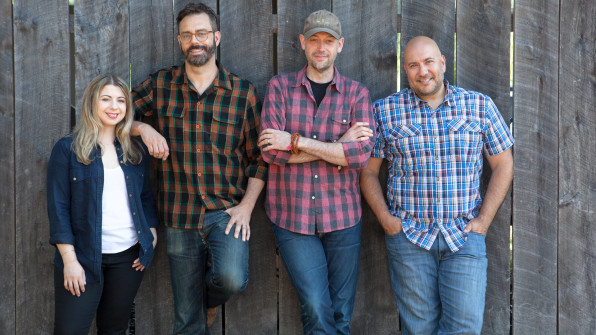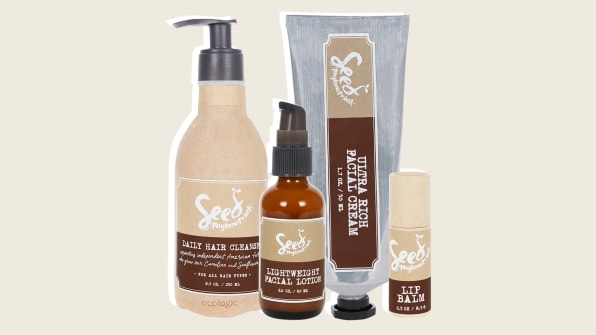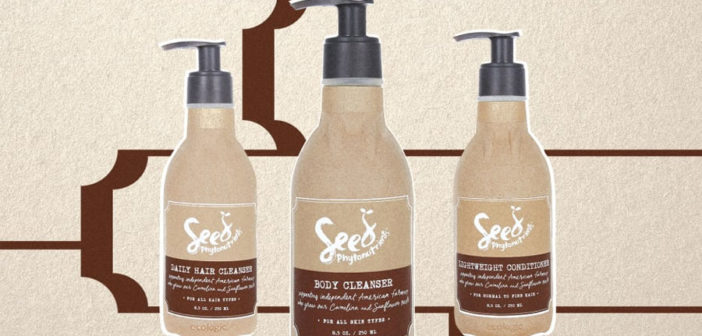The L’Oréal-funded startup Seed Phytonutrients sells its products in bottles made out of paper and clay.
The $445 billion beauty industry is blowing up, with new products flooding the market every day. To stand out on Sephora or Walgreen aisles, brands have resorted to more and more dramatic packaging.
Christian Louboutin’s lipsticks come in gold tubes that are so beautiful, some women use them as pendants on necklaces. Verso creates facial oils that come in four individual vials, which you pop into a spray bottle. Clé de Peau creates powders that come in shimmery holographic palette cases. It’s designed to be fun and beautiful. But it also means a lot of plastic and metal containers that will be chucked in the trash in a matter of months. Americans each generate 4.4 pounds of trash every day, and a full 30% of this comes from packaging.
Shane Wolf has watched this packaging one-upmanship in the beauty industry firsthand as an executive at L’Oréal, the $33 billion beauty conglomerate with dozens of brands within its portfolio. Over the last decade, Wolf has served in top roles at Keratase, Shu Uemura, Redken, and Pureology. But after years in the business he wanted to be part of a brand that was more mission driven.

In April, he launched a new brand, Seed Phytonutrients, which is funded by L’Oréal though it operates as a separate entity. Seed’s goal is to create non-synthetic, effective products that support small-scale organic farmers. The products in the line are designed to be sustainable inside and out. Seed’s bottles look downright rustic compared to the glitzy, sparkling bottles used by the rest of the industry. The light-brown paper bottles are so simple, they almost look like they were handmade at someone’s kitchen table.The packaging is the result of a collaboration with Ecologic, a design firm focused on sustainable materials. Founded by Julie Corbett in 2008, Ecologic has worked with some of the biggest brands in the world, including Nestlé and Seventh Generation, and Wolf initially struggled to lock down a meeting with Corbett. “I knew we had to work with her, but she wasn’t taking my calls or emails or Facebook messages,” he says. “I even contacted her daughter on LinkedIn and begged her to tell her mom about us. In the end, all it took was one in-person meeting to convince her that our values were aligned.”

Together, Wolf and Corbett created an entirely compostable bottle made from post-consumer paper, combined with clay that makes it water resistant and strong enough to resist shower water pressure. The bottle is made from two separate pieces of paper that are held together using an interlocking design rather than glue. And inside, there is a very thin, recyclable plastic container that holds the liquids, like soaps, shampoo, and conditioner. The exterior paper serves to strengthen and protect the plastic, which is 60% thinner than a typical plastic bottle. As a whole, Seed bottles use a fraction of the plastic used by other beauty brands. The bottles are then shipped in a nested fashion, to ensure that no space is wasted in the shipping containers.
The design team wanted to make sure that consumers would go on to recycle the bottles, so they ingeniously put a packet of organic seeds from the Hudson Valley Seed Company between the plastic and paper parts of the bottle. “Most people don’t have recycling in their bathrooms, where they would use our products,” says Wolf. “So the seeds encourage them to go to the kitchen, take the bottle apart, and recycle the different components.”
–
This article first appeared in www.fastcompany.com
Seeking to build and grow your brand using the force of consumer insight, strategic foresight, creative disruption and technology prowess? Talk to us at +9714 3867728 or mail: info@groupisd.com or visit www.groupisd.com

